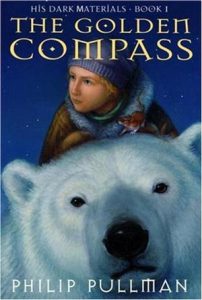 Title: The Golden Compass (His Dark Materials #1)
Title: The Golden Compass (His Dark Materials #1)
Author: Philip Pullman
Publisher: Alfred A. Knopf on April 16, 1996
Source: Purchased
Here lives an orphaned ward named Lyra Belacqua, whose carefree life among the scholars at Oxford’s Jordan College is shattered by the arrival of two powerful visitors. View Spoiler »
I first read The Golden Compass when I was twelve years old; now, almost a decade later, it remains one of the greatest children’s books that I’ve ever read. A modern classic, Pullman’s controversial novel has sparked intense debate regarding its portrayal of science and religion. Regardless of your stance on those issues, The Golden Compass‘ brilliance and beauty are not to be missed. If you read one classic children’s book this year, I think it should be this one.
Set in an alternate Edwardian England, the world of The Golden Compass at first glance seems very true to our own history. Historical elements like Oxford University, the spread of electricity, and increasing scientific inquiry are seamlessly blended with mysticism and magic. The most prevalent of these magical elements is the human/daimon relationship that binds a human and animal soul together. All human beings have daimons, and to see someone without one is like “seeing someone without a head.” Lyra and her daimon Pantalaimon illustrate how this bond transcends friendship; it is a meeting of minds and souls, a source of comfort so that one is never truly alone.
Lyra Belacqua is a fantastic SF/F heroine because her greatest strength is not supernatural: although she possesses the mysterious and innate ability to read the alethiometer, Lyra is propelled forward through terror and tragedy by her compassion for and loyalty towards her friends. When her best friend Roger is kidnapped by the Gobblers, she crosses vast territories at great personal risk to rescue him. I loved the scenes with Lyra and the Gyptians as they hurried across the treacherous ice on sleds towards the North, where the Gobblers were holding the abducted children. Pullman’s atmospheric writing allowed me to experience the beauty of the Aurora, as well as the Gyptians’ palpable urgency to reach the children in time.
When the agenda and practices of the Gobbler’s – or the General Oblation Board – was finally revealed, it was made all the more horrific because of how invested I was in the relationship between Lyra and her daimon Pantalaimon. I won’t say much on the subject since I don’t want to give away spoilers, but I will say that if you’re sensitive to animal cruelty then you should brace yourself.
Despite remembering how this first novel ends, I still had that amped-up feeling that you get when you’re unsure if a beloved character will live or die. Pullman’s writing is so tight in the final scenes The Golden Compass that I was literally on the edge of my seat (okay, the couch) as I barrelled through the final pages. Re-reading this classic children’s novel reminded me of the joy that can be found in fantasy. I think I can safely say that my reading slump has passed.
If you’re unsure whether The Golden Compass is for you, don’t worry – it is. Children, teens, and adult readers alike have read and loved this series for almost twenty years, and not without reason. This was my first re-read of a beloved book from my childhood that I’ve done as an adult that stood up to all my old memories of its awesomeness. I will definitely be re-reading the rest of the series.